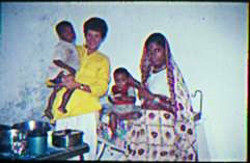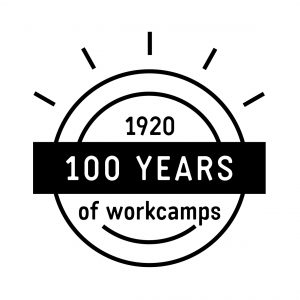Workcamps – 100 anni di storie

Name of the testimonial: Solvig Starborg
Sending Organization: IAL (SCI Sweden)
Year of the workcamp: 1970
Place of the workcamp: New Delhi, India
Host organization: SOS children’s village
What was your motivation to join a workcamp?
The 1950s and ’60s was a time when the horrors of the Second World War were still fresh in people’s memory. It was also a time of improved media and news reporting and therefore an increased awareness about the plight of people in other countries, where there was war and famine.
My first ‘international experience’ was in the early 60s when I went with a school friend to a work camp in Norfolk in England during the school holiday. It was organised by the National Union of Students and turned out to be both educating and enjoyable. The summer after I had finished my Alevels I went to Israel to work in a kibbutz. Again I met people from other parts of the world but also learnt about life in Israel, both from Jews and Muslims. The kibbutz was along the Jordan River and the work was agricultural. It was my first experience of a war zone. Every now and again, when there was an exchange of fire across the river, we had to go and sit in bunkers. The noise of machineguns was excruciating and I remember wondering how people could survive, not only the war but also the noise of it.
When I came back from Israel I worked the autumn term as an unqualified teacher in a small fishing village. In my class I had thirteen 9 year old pupils. Feeling the need to promote international exchange I had my class draw pictures and write a story about themselves which we then sent to the school on the kibbutz. It was with great excitement they received a reply with what they thought very exotic drawings of among other things orange-trees!
I finished my nursing training in the spring of 1969 and my first job was at The Serafimer Hospital in central Stockholm.
What did you take from that experience?
I had not been long in Stockholm when I started to try and find out about working in India. Eventually, through the Indian Embassy, I got in touch with Bharat Sevak Samaj and Major Ramachandra who offered to find me voluntary work. I also had some contact with IAL, the Swedish branch of SCI but they were a rather small organisation with limited resources. However, one member, Jan Simon, had travelled to India and not only put me in contact with another member, Lena, who wanted to go to India, but also gave me Valli Seshan’s address. Little did I know then how valuable that last piece of information was going to be! We tried in vain with the help of Major Ramachandra to obtain visas to go to India and work as volunteers for a year. It wasn’t really possible because we didn’t have a specific job to go to. In the end we decided to travel on tourist visas which would last for three months and could be extended another three months.
Lena had friends in Delhi, a young Sikh couple, Gurmel and Harnek Dhillon, who had offered us initial hospitality on arrival. We arrived in New Delhi in September 1970. The day after our arrival we went to meet Major Ramachandra who had a small office behind the public toilets in Connaught Place in Delhi. He welcomed us to India and told us about Mahatma Gandhi. During my time in India I got to know Major Ramachandra quite well. Initially Lena and I were two restless Europeans who were trying to acclimatise ourselves to life in India and his advice was: “Be happy and keep smiling; there are many lives to come”. It has followed me through life!
We were soon introduced to Mr Kaul who was in charge of the SOS children’s village outside Delhi. They needed a nurse for a month to run the dispensary and we were happy to have our first task as volunteers in India. We would work for food and lodging. The village consisted of a group of houses and in each of them lived 6 – 8 orphaned children with a ‘mother’. These women were either widows, divorced or had refused to marry. There were also a number of ‘aunties’, who went to the different houses and helped the mothers if they needed help or time off.
Lena became a temporary auntie and I was working in the dispensary with Surya, who was a lab assistant from Bombay. Surya was happy and easy going and taught me a lot. I had my first Hindi lessons from her and she also lent me books on tropical diseases, in particular on intestinal worms which were quite common among the children. She also introduced me to, what she called ‘Indian thinking’! She was a Christian but said God is one. Sometimes we went to puja (a ceremony) in one of the houses and then Surya would add a picture of Jesus to the Hindu gods and we gave sweets and then sang hymns as well. I remember thinking it was very generous to just include everyone! We also met Mrs Pohl who was an Austrian lady who had helped set up the village and who was going to Nepal to start another SOS village.
The work in the dispensary was mainly cleaning up little injuries, putting on plasters and giving worm treatments. Sometimes we had to take children to hospital in Delhi for more serious complaints.
In the evenings people from a nearby village would come to collect rations of milk powder and also for medical help and we tried to help as best we could. Our month was quickly up and we were sad to leave ‘our’ village. What we found so amazing was that we had been accepted straight away. We were two foreigners and people trusted us and included us in their lives just like that. We felt we were leaving old friends behind when we left!
What do you still carry with you?
My introduction to SCI was really via Bharat Sevak Samaj and Major Ramachandra and the spirit of Gandhi’s teaching. I hadn’t been selected and briefed like the other LTVs but I felt a kinship with the SCI people straight away. It was as if I had found my ‘international family’ and I belonged there. We all wanted to make the world better! It also taught me a lot about cultural understanding, not least looking at my own culture with different eyes.
I still work as a Health Visitor in inner London and in our case load we have about twenty different ethnic groups. My colleagues are also of a rich ethnic mix. I may visit a Pakistani family, a Polish family and a Somali family all in a morning’s work. I spend my time communicating with people from different cultures and I think the skills I have developed were first initiated in those early days with SCI. Maybe that is why I have ended up living in London, you can stay here and meet the world!









